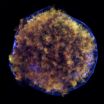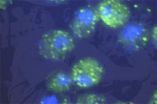(Press-News.org) Among obese patients, activation of the protein biomarker CTNNB1 was associated with better colorectal cancer-specific survival and overall survival, whereas post-diagnosis physical activity was associated with better colorectal cancer-specific survival among patients negative for CTNNB1, according to a study in the April 27 issue of JAMA.
Activation of the WNT signaling pathway (a network of proteins known for their roles in cancer) and cadherin-associated protein beta-1 (CTNNB1; [beta-catenin]) plays a critical role in colorectal carcinogenesis. Accumulating evidence indicates a role of WNT-CTNNB1 signaling in obesity and metabolic diseases, according to background information in the article. Considering the dual roles of CTNNB1 in carcinogenesis and energy metabolism, the authors hypothesized that activation of WNT-CTNNB1 signaling might confer proliferative ability to cancer cells. "In addition, epidemiological evidence suggests causal effects of obesity or excess energy balance on colon cancer incidence and mortality. Notably, physical activity (exercise) has emerged as a modifiable lifestyle factor that may improve cancer survival," the authors write.
Teppei Morikawa, M.D., Ph.D., of the Dana-Farber Cancer Institute, Boston, and colleagues conducted a study to examine whether CTNNB1 activation in colorectal cancer modified prognostic associations of body mass index (BMI) and level of postdiagnosis physical activity. The study included data from 2 U.S. prospective cohort studies (Nurses' Health Study and the Health Professionals Follow-up Study) to evaluate CTNNB1 among 955 patients with stage I, II, III, or IV colon and rectal cancer from 1980 through 2004. A model was used to compute the risk of death, adjusting for clinical and tumor features.
During follow-up through June 2009, there were 440 deaths, which included 266 colorectal cancer-specific deaths. Analysis indicated there was a significant modifying effect of BMI. In obese patients (BMI 30 or greater), positive status for nuclear CTNNB1 was associated with significantly better colorectal cancer-specific survival (5-year survival: 0.85 for patients with positive nuclear CTNNB1 status vs. 0.78 for those with negative status) and overall survival (5-year survival, 0.77 for patients with positive nuclear CTNNB1 status vs. 0.74 for those with negative status). In contrast, among nonobese patients, positive status for nuclear CTNNB1 was not significantly associated with cancer-specific survival or overall survival.
The authors also found that for patients with negative status for nuclear CTNNB1, high level of postdiagnosis physical activity was associated with significantly better colorectal cancer-specific survival (5-year survival, 0.97 vs. 0.89). However, for patients with positive status for CTNNB1, physical activity was not associated with colorectal cancer-specific survival or with overall survival.
"These results provide evidence for a possible interactive effect of tumor CTNNB1 signaling and patients' energy balance status in determining tumor cell behavior. Our data support the hypothesis that progression of a tumor with an inactive WNT-CTNNB1 signaling pathway might be influenced by energy intake and expenditure, whereas a tumor with an active WNT-CTNNB1 signaling pathway might progress independent of energy balance status. Although our data need to be confirmed by independent data sets, tumor CTNNB1 status may serve as a predictive biomarker for response to a prescription for physical activity (exercise) in clinical practice. Because physical activity is a modifiable lifestyle factor, our data may have considerable clinical implications," the authors write.
###
(JAMA. 2011;305[16]1685-1694. Available pre-embargo to the media at www.jamamedia.org)
Editor's Note: Please see the article for additional information, including other authors, author contributions and affiliations, financial disclosures, funding and support, etc.
To contact corresponding author Shuji Ogino, M.D., Ph.D., M.S., call Anne Doerr at 617-632-5665 or email anne_doerr@dfci.harvard.edu. END
Activation of biomarker linked with improved survival among obese patients with colorectal cancer
2011-04-27
ELSE PRESS RELEASES FROM THIS DATE:
Studies of mutated protein in Lou Gehrig’s disease reveal new paths for drug discovery
2011-04-27
PHILADELPHIA -- Several genes have been linked to ALS, with one of the most recent called FUS. Two new studies in PLoS Biology, one from the University of Pennsylvania School of Medicine, and the other from colleagues at Brandeis University, both examined FUS biology in yeast and found that defects in RNA biology may be central to how FUS contributes to ALS, or Lou Gehrig's disease. These findings point to new targets for developing drugs.
Proteins aggregate to form insoluble clumps in the brain and spinal cord of ALS patients. In some instances of ALS, the clumping ...
Teen sleep study adds to evidence of a 'neural fingerprint'
2011-04-27
PROVIDENCE, R.I. [Brown University] — Teens are rarely described as stable, so when something about their rapidly changing brains remains placidly unaltered, neuroscientists take notice. Such is the case in a new study of electroencephalography (EEG) readings gathered from dozens of teens while they slept. Despite the major neural overhaul underway during adolescence, most individuals maintained a unique and consistent pattern of underlying brain oscillations. The work lends a new level of support to the idea, already observed in adults, that people produce a kind of brainwave ...
Will minorities be left out of health care law provision?
2011-04-27
Hospitals and physician practices that form care-coordinating networks called "Accountable Care Organizations (ACOs)," under provisions of the new health-care law could reap cost-savings and other benefits. However, experts at Johns Hopkins and the University of Pennsylvania warn that such networks could potentially be designed to exclude minorities and widen disparities in health care.
In a commentary appearing in the April 27 issue of the Journal of the American Medical Association, a Johns Hopkins physician says that as a result of new provisions in the Patient Protection ...
Dr Isabel Driggers, of Coastal Kids Dental & Braces, Was Selected as the South Carolina Delegate for the American Academy of Pediatric Dentist (AAPD) 2011 Congressional Lobby Day
2011-04-27
Coastal Kids Dental & Braces is proud to announce that Dr. Isabel Driggers, Owner and Founder of Coastal Kids Dental & Braces, was selected as the South Carolina representative by the AAPD to attend the 2011 Congressional Lobby Day. This is the 2nd year that Dr. Isabel has attending the AAPD Lobby Day as the SC representative.
As part of the AAPD Congressional Lobby Day, Dr. Isabel visited Washington, DC and met with the offices of Senators Lindsey Graham and Jim DeMint and Congressmen Tim Scott and Jim Clyburn to discuss current issues in Pediatric Dentistry ...
Chandra finds new evidence on origin of supernovas
2011-04-27
Astronomers may now know the cause of an historic supernova explosion that is an important type of object for investigating dark energy in the universe. The discovery, made using NASA's Chandra X-ray Observatory, also provides strong evidence that a star can survive the explosive impact generated when a companion star goes supernova.
The new study examined the remnant of a supernova observed by the Danish astronomer Tycho Brahe in 1572. The object, dubbed Tycho for short, was formed by a Type Ia supernova, a category of stellar explosion useful in measuring astronomical ...
Canadians should demand commitments for pharmacare program, says CMAJ
2011-04-27
OTTAWA, ONTARIO, CANADA — Canada needs a national pharmacare program and federal leaders must commit adequate funding, states an editorial in CMAJ (Canadian Medical Association Journal) http://www.cmaj.ca/cgi/doi/10.1503/cmaj.110643.
Unlike many countries in Europe and Australia and New Zealand, Canada lacks a national pharmacare program that provides consistent coverage across all regions of the country. Currently, drugs that are covered in some provinces may not be in others.
"The inevitable consequence is that some people are prevented from getting the drugs they ...
Men's and women's immune systems respond differently to PTSD
2011-04-27
Men and women had starkly different immune system responses to chronic post-traumatic stress disorder, with men showing no response and women showing a strong response, in two studies by researchers at the San Francisco VA Medical Center and the University of California, San Francisco.
While a robust immune response protects the body from foreign invaders, such as bacteria and viruses, an over-activated response causes inflammation, which can lead to such conditions as cardiovascular disease and arthritis.
In a study published in the March, 2011 issue of Brain, Behavior, ...
CU-Boulder leading study of wind turbine wakes
2011-04-27
While wind turbines primarily are a source of renewable energy, they also produce wakes of invisible ripples that can affect the atmosphere and influence wind turbines downstream -- an issue being researched in a newly launched study led by the University of Colorado Boulder's Julie Lundquist, assistant professor in the atmospheric and oceanic sciences department.
The study, called the Turbine Wake and Inflow Characterization Study, or TWICS, also includes researchers from the National Oceanic and Atmospheric Administration, the U.S. Department of Energy's National Renewable ...
Researchers at Brandeis University make strides in understanding amyotrophic lateral sclerosis
2011-04-27
Brandeis researchers have made a significant advance in the effort to understand amyotrophic lateral sclerosis (ALS) by successfully reversing the toxicity of the mutated protein in the familial type of the disease.
Currently there is no cure or prevention for the disease, which affects nerve cells in the brain and the spinal cord. Most frequently referred to as Lou Gehrig's disease, after its most famous victim, ALS typically causes death due to respiratory paralysis within three to five years of onset. The only approved drug, Riluzole, can extend the lifespan of some ...
Cold case: Siberian hot springs reveal ancient ecology
2011-04-27
Exotic bacteria that do not rely on oxygen may have played an important role in determining the composition of Earth's early atmosphere, according to a theory that UChicago researcher Albert Colman is testing in the scalding hot springs of a volcanic crater in Siberia.
He has found that bacteria at the site produce as well as consume carbon monoxide, a surprising twist that scientists must take into account as they attempt to reconstruct the evolution of Earth's early atmosphere.
Colman, an assistant professor in geophysical sciences, joined an American-Russian team ...





